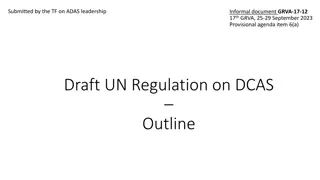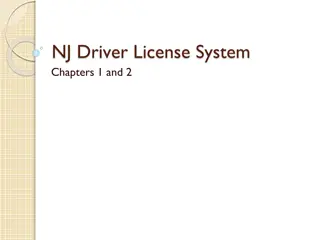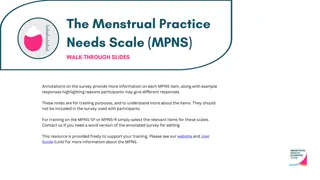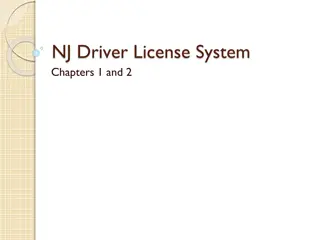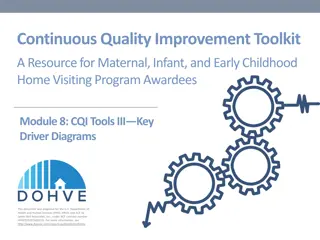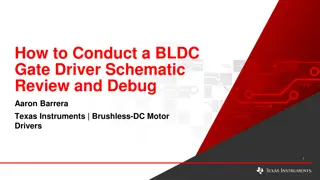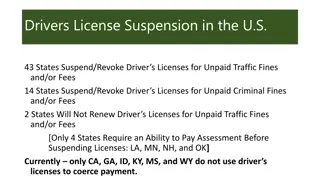Understanding Driver Annotations in Depth
Explore the comprehensive guide on Driver Annotations covering motivation, general techniques, structural annotations, additional checks, resources, IRQLs, and more. Learn about the benefits of annotating code, applicability, assumptions, and annotation design to enhance driver development and ensure effective use of interfaces.
Download Presentation

Please find below an Image/Link to download the presentation.
The content on the website is provided AS IS for your information and personal use only. It may not be sold, licensed, or shared on other websites without obtaining consent from the author. Download presentation by click this link. If you encounter any issues during the download, it is possible that the publisher has removed the file from their server.
E N D
Presentation Transcript
Driver Annotations in Depth Part I Donn Terry Senior SDE Static Analysis for Drivers sdvpfdex@microsoft.com
Introduction Two hour talk effective use of annotations. Part 1: Motivation, general techniques Buffer annotations Structural annotations: __success, __on_failure, __drv_when, __drv_at, __valid, __pre and __post __deref, __drv_valueIs Part 2 (Next hour) Driver annotations: additional checks, resources, IRQLs, PAGED_CODE, floating point. TalkObjectives Intuition on what annotations are and why use them General explanation of common/typical annotations Introduce the documentation Breadth, not depth.
Why Annotate? Good engineering practice Enables Design Rule Checking, also known as Static Analysis Precisely describe the part you re building and the contract that it represents Enable automatic checking Effective (and checked) documentation You don t have to guess or experiment Code and documentation don t drift apart Speed driver development Fewer false starts Fewer turn-on bugs Faster deployment Fewer as-deployed bugs
Applicability Annotate as early as possible (as part of design) Catch-up is still very useful Run PFD as soon as the code begins to compile x86, x64 C/C++ Any kind of driver Applets, too, with right annotations.
Assumptions You know what __in, __out, and _opt are. You know about function typedefs/role types. If you missed that, review Session 690. Everyone here is an expert programmer, and this shouldn t be hard for experts. But it is new; there s some learning and getting used to to do. Plenty of reference material see it for details.
Annotation Design Enable effective use of the interfaces Describe what is required for success Concisely express the semantics to users Help the tool analyze for improper use or unintended consequences Recommend more effective alternatives Suppress noise
Tip Annotate for the Success Case You want a function call that will never succeed to be caught statically Optional means it will do something useful if the parameter is absent Checking for null and returning an error is good defensive coding practice, but doesn t make the parameter optional The same general idea applies to other annotations we ll see later
ExAllocatePool What does it do?
NTKERNELAPI PVOID ExAllocatePool( __in POOL_TYPE PoolType, __in SIZE_T NumberOfBytes );
__drv_allocatesMem(Mem) NTKERNELAPI PVOID ExAllocatePool( __in POOL_TYPE PoolType, __in SIZE_T NumberOfBytes );
__drv_allocatesMem(Mem) __bcount(NumberOfBytes) NTKERNELAPI PVOID ExAllocatePool( __in POOL_TYPE PoolType, __in SIZE_T NumberOfBytes );
__drv_allocatesMem(Mem) __post __maybenull __bcount(NumberOfBytes) NTKERNELAPI PVOID ExAllocatePool( __in POOL_TYPE PoolType, __in SIZE_T NumberOfBytes );
__drv_allocatesMem(Mem) __post __maybenull __checkReturn __bcount(NumberOfBytes) NTKERNELAPI PVOID ExAllocatePool( __in POOL_TYPE PoolType, __in SIZE_T NumberOfBytes );
__drv_allocatesMem(Mem) __drv_when(((PoolType&( POOL_RAISE_IF_ALLOCATION_FAILURE)))==0, __post __maybenull __checkReturn) __bcount(NumberOfBytes) NTKERNELAPI PVOID ExAllocatePool( __in POOL_TYPE PoolType, __in SIZE_T NumberOfBytes );
__drv_allocatesMem(Mem) __drv_when(((PoolType&( POOL_RAISE_IF_ALLOCATION_FAILURE)))==0, __post __maybenull __checkReturn) __drv_when(((PoolType&( POOL_RAISE_IF_ALLOCATION_FAILURE)))!=0, __post __notnull) __bcount(NumberOfBytes) NTKERNELAPI PVOID ExAllocatePool( __in POOL_TYPE PoolType, __in SIZE_T NumberOfBytes );
__drv_allocatesMem(Mem) __drv_when(((PoolType&( POOL_RAISE_IF_ALLOCATION_FAILURE)))==0, __post __maybenull __checkReturn) __drv_when(((PoolType&( POOL_RAISE_IF_ALLOCATION_FAILURE)))!=0, __post __notnull) __bcount(NumberOfBytes) NTKERNELAPI PVOID ExAllocatePool( __drv_strictTypeMatch(__drv_typeExpr) __in POOL_TYPE PoolType, __in SIZE_T NumberOfBytes );
__drv_allocatesMem(Mem) __drv_when(((PoolType&0x1))!=0, __drv_maxIRQL(APC_LEVEL)) __drv_when(((PoolType&0x1))==0, __drv_maxIRQL(DISPATCH_LEVEL)) __drv_when(((PoolType&( POOL_RAISE_IF_ALLOCATION_FAILURE)))==0, __post __maybenull __checkReturn) __drv_when(((PoolType&( POOL_RAISE_IF_ALLOCATION_FAILURE)))!=0, __post __notnull) __bcount(NumberOfBytes) NTKERNELAPI PVOID ExAllocatePool( __drv_strictTypeMatch(__drv_typeExpr) __in POOL_TYPE PoolType, __in SIZE_T NumberOfBytes );
__drv_allocatesMem(Mem) __drv_when(((PoolType&0x1))!=0, __drv_maxIRQL(APC_LEVEL)) __drv_when(((PoolType&0x1))==0, __drv_maxIRQL(DISPATCH_LEVEL)) __drv_when(((PoolType&0x2))!=0, __drv_reportError("Must succeed pool allocations are forbidden. " "Allocation failures cause a system crash")) __drv_when(((PoolType&( POOL_RAISE_IF_ALLOCATION_FAILURE)))==0, __post __maybenull __checkReturn) __drv_when(((PoolType&( POOL_RAISE_IF_ALLOCATION_FAILURE)))!=0, __post __notnull) __bcount(NumberOfBytes) NTKERNELAPI PVOID ExAllocatePool( __drv_strictTypeMatch(__drv_typeExpr) __in POOL_TYPE PoolType, __in SIZE_T NumberOfBytes );
__drv_allocatesMem(Mem) __drv_when(((PoolType&0x1))!=0, __drv_maxIRQL(APC_LEVEL)) __drv_when(((PoolType&0x1))==0, __drv_maxIRQL(DISPATCH_LEVEL)) __drv_when(((PoolType&0x2))!=0, __drv_reportError("Must succeed pool allocations are forbidden. " "Allocation failures cause a system crash")) __drv_when(((PoolType&(0x2|POOL_RAISE_IF_ALLOCATION_FAILURE)))==0, __post __maybenull __checkReturn) __drv_when(((PoolType&(0x2|POOL_RAISE_IF_ALLOCATION_FAILURE)))!=0, __post __notnull) __bcount(NumberOfBytes) NTKERNELAPI PVOID ExAllocatePool( __drv_strictTypeMatch(__drv_typeExpr) __in POOL_TYPE PoolType, __in SIZE_T NumberOfBytes );
__drv_preferredFunction("ExAllocatePoolWithTag", "No tag interferes with debugging.") __drv_allocatesMem(Mem) __drv_when(((PoolType&0x1))!=0, __drv_maxIRQL(APC_LEVEL)) __drv_when(((PoolType&0x1))==0, __drv_maxIRQL(DISPATCH_LEVEL)) __drv_when(((PoolType&0x2))!=0, __drv_reportError("Must succeed pool allocations are forbidden. " "Allocation failures cause a system crash")) __drv_when(((PoolType&(0x2|POOL_RAISE_IF_ALLOCATION_FAILURE)))==0, __post __maybenull __checkReturn) __drv_when(((PoolType&(0x2|POOL_RAISE_IF_ALLOCATION_FAILURE)))!=0, __post __notnull) __bcount(NumberOfBytes) NTKERNELAPI PVOID ExAllocatePool( __drv_strictTypeMatch(__drv_typeExpr) __in POOL_TYPE PoolType, __in SIZE_T NumberOfBytes );
Problem Buffer overruns Buffer overruns are always a risk Reliability Security PFD can check that the size you expect is the size you used You can specify the size in bytes or elements PFD finds: Buffer isn t as big as the size (caller and callee) Running off end (or beginning) of buffer No information or unhelpful information about size
Buffer Annotations _bcount: where to find the size, in bytes. _ecount: where to find the size, in elements _part, _full: is all the buffer used (and how much) Compose into single tokens like __deref_inout_ecount_part(size,length)
Example Buffer annotations NTKERNELAPI PIRP IoBuildDeviceIoControlRequest( __in ULONG IoControlCode, __in PDEVICE_OBJECT DeviceObject, __ __in_opt_bcount in_opt_bcount( (InputBufferLength __in ULONG InputBufferLength, __ __out_opt_bcount out_opt_bcount( (OutputBufferLength __in ULONG OutputBufferLength, __in BOOLEAN InternalDeviceIoControl, __in PKEVENT Event, __out PIO_STATUS_BLOCK IoStatusBlock ); InputBufferLength) ) PVOID InputBuffer, OutputBufferLength) ) PVOID OutputBuffer, Fewer buffer overruns
Problem Ignoring errors Some functions can fail, but it s easy to forget to check. PFD can remind you __ __checkReturn checkReturn NTSTATUS KeSaveFloatingPointState( __out PKFLOATING_SAVE FloatSave ); Use on functions that return NULL when they fail. Reminds you to test the result (avoid bluescreens). Never forget to check for success again
Implied Annotations Smarter Types typedefs can be annotated The annotation applies to objects of that type typedef wchar_t *LPWCH; Contrast with this: typedef __nullterminated wchar_t *LPWSTR; The first is a simple buffer, the second is a C String. The difference is the annotation. More than just saving typing, it documents intent and allows PFD to check that the intent is fulfilled.
Structural Annotations How the annotations apply Describe when and where an annotation applies; apply to functional annotations __success, __failure, __on_failure, __failure_default __drv_when __drv_at __pre, __post -> __drv_in(), __drv_out() __valid Composable (they nest)
__success When interfaces can fail typedef __success(return >= 0) LONG NTSTATUS; __success(<expression>) tells PFD that the contract will not be met if the expression is false. Built in to NTSTATUS (and HRESULT) Most system interfaces can then succeed or fail (meet contract or not). Generally the right answer, but there are exceptions.
__success When the function never fails __success(TRUE) NTSTATUS IoCallDriver( Function always succeeds, return value is NTSTATUS, but just as information: IoCallDriver returns the status from a lower level in the stack. It always succeeds.
__on_failure Contract when failure Sometimes the failure path does something useful: NTKERNELAPI NTSTATUS IoCreateDevice( __drv_out_deref( __drv_allocatesMem(Mem) __drv_valueIs(!=0) __on_failure(__null) ) PDEVICE_OBJECT *DeviceObject );
__failure Defining failure __success defines what return values cause the contract to be met. PFD assumes all others are failure (contract not met) But sometimes code (unconsciously) assumes that other values are impossible, and impossible values yield noise __failure(expression) says what values are considered failure All others are impossible and won t cause noise (are not analyzed). typedef __success(return == 0)__failure(return < 0) LONG MYSTATUS;
__on_failure Undefined Results When a function fails, it s often unsafe to look at the results. Don t look at this value on the failure path: __on_failure(__valueUndefined) Don t look at any output if the function fails: __failureDefault(__failureUndefined) PFD will report using an uninitialized variable.
__drv_when(condition, annotations) Conditional operator __drv_when(<condition>, <annotation> <annotation> ) Guards , not quite if Group automatically Condition can be static or simulation time Side-effect-free C/C++ expression: + - * / % & | && || < > == != <= >= << >> ^ ( ) -> . [] * Operands: Parameter names, this , return , __param(n), variables, field names Constants, C++ consts, enums (some symbol limitations in C++) (static) casts, sizeof A few functions: inFunctionClass$, macroValue$, macroDefined$, strstr$
__drv_when(condition, annotations) Uses __drv_when(((PoolType&(0x2|POOL_RAISE_IF_ALLOCATION_FAILURE)))==0, __post __maybenull __checkReturn) __drv_when(NTDDI_VERSION >= NTDDI_WINXP, __drv_preferredFunction("IoVolumeDeviceToDosName", "Obsolete on WINXP and above")) __drv_maxIRQL(PASSIVE_LEVEL) NTSYSAPI NTSTATUS NTAPI RtlVolumeDeviceToDosName( __in PVOID VolumeDeviceObject, __out PUNICODE_STRING DosName );
__drv_at(target, annotations) Placement operator __drv_at(<expression>, <annotation> <annotation> ) Annotate complex operands Annotate invisible objects: this Annotate difficult cases more readably __drv_at(this, __drv_freesMem(Mem)) void Release(void); The target: Same syntactic rules as __drv_when (side-effect free C/C++ expression) Must yield an l-value at compile time
__drv_at(target, annotations) Examples __drv_at(pUnicodeString->Buffer, __nullterminated) The following annotation can go anywhere on the function. In particular it can come before the function name in the return position. drv_when(pBuffer!=0 && cjBufferSize!=0, __drv_at(return, __drv_valueIs(==0;==1)) __drv_when(return==1, __drv_at(return, __drv_floatSaved) __drv_at(pBuffer, __bcount_opt(cjBufferSize) __drv_acquiresResource(EngFloatState)) (I m not saying this is a good interface design!)
__valid The object being annotated has a well-formed value. The definition/expression of well-formed is evolving, but it always means at least initialized. __in and __out include __valid But when does __valid apply in a function call? Before or after? It depends on what you care about.
__pre and __post Semantics __in -> __pre __valid (etc.) __out -> __post __valid (etc.) Caller/callee distinction here: Caller promises that the inputs will be valid. Callee assumes that the inputs are valid. Callee promises that the outputs will be valid (on success) Caller assumes that the outputs are valid (on success) Many annotations obviously only pre or post Some annotations apply in both cases Use __pre and __post where that s an issue.
__pre and __post Placement Unary operators that apply only to the next (one) real annotation. Parameters are by default __pre (and value parameters have to be). (Consider this a parameter). return is always post . Using __pre is actually rare except for explicitness.
__drv_in() and __drv_out() __pre/__post are operators: scoping is sometimes unexpected __drv_in and __drv_out do the same thing, but with appropriate scoping inside the ()s These are safer, but pre/post are more fundamental concepts.
__deref Equivalent to __drv_at(*<current param>, ) Unary operator applies to only next annotation. Somewhat archaic. Used heavily in existing macros: __drv_in_deref() and __drv_out_deref() void fun (__deref __deref __notnull long **p); void fun (__drv_at(**p, __notnull) long **p); These are the same annotation.
__drv_valueIs(<list>) Specify possible result values. Takes ; separated list of partial expressions: == <const expr> ; <= <cost expr>; etc. __checkReturn __drv_minIRQL(DISPATCH_LEVEL) __drv_valueIs(==1;==0) NTKERNELAPI BOOLEAN FASTCALL KeTryToAcquireSpinLockAtDpcLevel ( __inout __deref __drv_neverHold(SpinLock) __drv_when(return!=0, __deref __drv_acquiresResource(SpinLock)) PKSPIN_LOCK SpinLock );
To be continued next hour Driver Annotations additional checks, resources, IRQLs, PAGED_CODE, floating point.
Additional Resources Web resources WHDC Web site PREfast step-by-step http://www.microsoft.com/whdc/DevTools/tools/PREfast_steps.mspx PREfast annotations http://www.microsoft.com/whdc/DevTools/tools/annotations.mspx How to Use Function typedefs in C++ Driver Code to Improve PRE ast Results http://go.microsoft.com/fwlink/?LinkId=87238 Blog: http://blogs.msdn.com/staticdrivertools/default.aspx WDK documentation on MSDN PREfast for Drivers http://msdn.microsoft.com/en-us/library/aa468782.aspx Chapter 23 in Developing Drivers with the Windows Driver Foundation http://www.microsoft.com/MSPress/books/10512.aspx E-mail sdvpfdex @ microsoft.com
Related Sessions Session Day / Time Using Static Analysis Tools When Developing Drivers Mon. 8:30-9:30 Driver Annotations in Depth: Part 2 Mon. 2:45-3:45 Lab: PREfast for Drivers Mon. 11-12 and Wed. 8:30-9:30 Lab: Static Driver Verifier for WDM, KMDF, and NDIS Mon. 5:15-6:15 and Wed. 11-12 Integrating PREfast into Your Build by Using Microsoft Auto Code Review Tues. 4-5 Using Static Driver Verifier to Analyze KMDF Drivers Mon. 4-5 Using Static Driver Verifier to Analyze NDIS Drivers Tues. 9:45-10:45 Using Static Driver Verifier to Analyze Windows Driver Model Drivers Wed. 9:45-10:45




